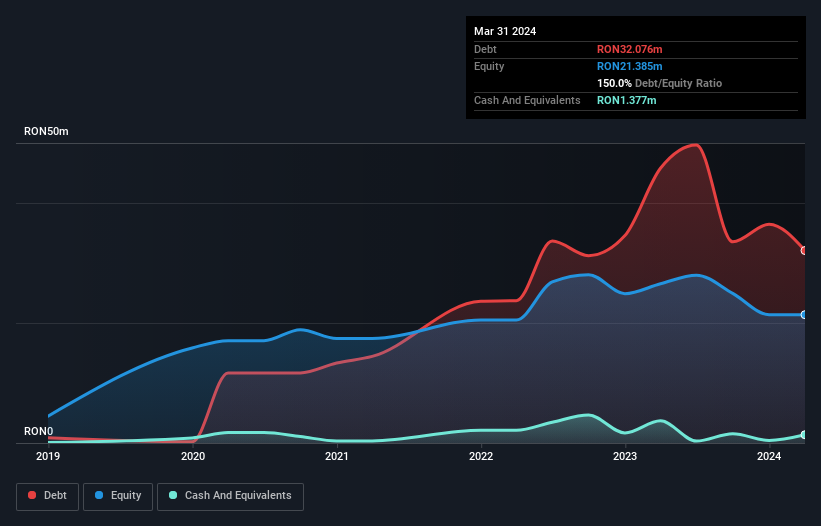Warren Buffett famously said, 'Volatility is far from synonymous with risk.' So it might be obvious that you need to consider debt, when you think about how risky any given stock is, because too much debt can sink a company. We note that Norofert S.A. (BVB:NRF) does have debt on its balance sheet. But the real question is whether this debt is making the company risky.
Why Does Debt Bring Risk?
Debt and other liabilities become risky for a business when it cannot easily fulfill those obligations, either with free cash flow or by raising capital at an attractive price. In the worst case scenario, a company can go bankrupt if it cannot pay its creditors. However, a more frequent (but still costly) occurrence is where a company must issue shares at bargain-basement prices, permanently diluting shareholders, just to shore up its balance sheet. By replacing dilution, though, debt can be an extremely good tool for businesses that need capital to invest in growth at high rates of return. When we think about a company's use of debt, we first look at cash and debt together.
See our latest analysis for Norofert
What Is Norofert's Net Debt?
As you can see below, Norofert had RON32.1m of debt at March 2024, down from RON45.8m a year prior. However, it also had RON1.38m in cash, and so its net debt is RON30.7m.

How Healthy Is Norofert's Balance Sheet?
Zooming in on the latest balance sheet data, we can see that Norofert had liabilities of RON33.8m due within 12 months and liabilities of RON19.8m due beyond that. Offsetting these obligations, it had cash of RON1.38m as well as receivables valued at RON31.5m due within 12 months. So its liabilities outweigh the sum of its cash and (near-term) receivables by RON20.7m.
While this might seem like a lot, it is not so bad since Norofert has a market capitalization of RON68.5m, and so it could probably strengthen its balance sheet by raising capital if it needed to. But we definitely want to keep our eyes open to indications that its debt is bringing too much risk. There's no doubt that we learn most about debt from the balance sheet. But it is Norofert's earnings that will influence how the balance sheet holds up in the future. So when considering debt, it's definitely worth looking at the earnings trend. Click here for an interactive snapshot.
Over 12 months, Norofert made a loss at the EBIT level, and saw its revenue drop to RON42m, which is a fall of 41%. That makes us nervous, to say the least.
Caveat Emptor
Not only did Norofert's revenue slip over the last twelve months, but it also produced negative earnings before interest and tax (EBIT). Indeed, it lost RON2.4m at the EBIT level. When we look at that and recall the liabilities on its balance sheet, relative to cash, it seems unwise to us for the company to have any debt. So we think its balance sheet is a little strained, though not beyond repair. We would feel better if it turned its trailing twelve month loss of RON5.6m into a profit. So to be blunt we do think it is risky. When analysing debt levels, the balance sheet is the obvious place to start. However, not all investment risk resides within the balance sheet - far from it. Be aware that Norofert is showing 3 warning signs in our investment analysis , and 2 of those are a bit unpleasant...
Of course, if you're the type of investor who prefers buying stocks without the burden of debt, then don't hesitate to discover our exclusive list of net cash growth stocks, today.
Valuation is complex, but we're here to simplify it.
Discover if Norofert might be undervalued or overvalued with our detailed analysis, featuring fair value estimates, potential risks, dividends, insider trades, and its financial condition.
Access Free AnalysisHave feedback on this article? Concerned about the content? Get in touch with us directly. Alternatively, email editorial-team (at) simplywallst.com.
This article by Simply Wall St is general in nature. We provide commentary based on historical data and analyst forecasts only using an unbiased methodology and our articles are not intended to be financial advice. It does not constitute a recommendation to buy or sell any stock, and does not take account of your objectives, or your financial situation. We aim to bring you long-term focused analysis driven by fundamental data. Note that our analysis may not factor in the latest price-sensitive company announcements or qualitative material. Simply Wall St has no position in any stocks mentioned.
About BVB:NRF
Norofert
Produces and sells fertilizers and agricultural products in Romania.
Low risk and slightly overvalued.
Market Insights
Community Narratives




